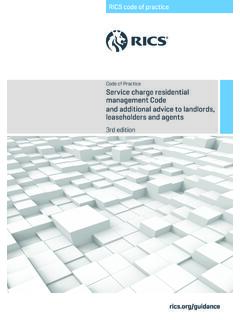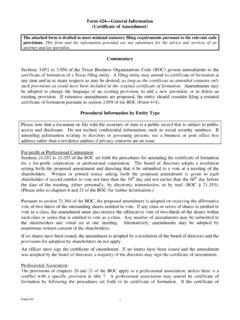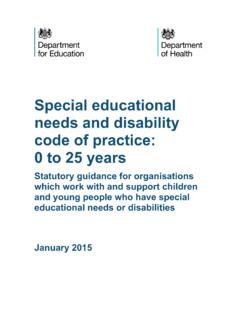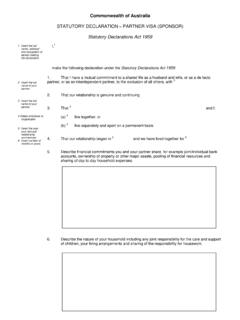Transcription of Home Office Guidance - GOV.UK
1 home Office Guidance Conduct, Efficiency and Effectiveness: statutory Guidance on Professional Standards, Performance and Integrity in Policing Version Version Published: 5 February 2020 Page 0 of 277 CONDUCT EFFICIENCY AND EFFECTIVENESS Guidance CONTENTS SECTION 1: INTRODUCTION CHAPTER 1: BACKGROUND & APPLICATION 4 CHAPTER 2: STANDARDS OF PROFESSIONAL BEHAVIOUR 9 CHAPTER 3: CHALLENGING IMPROPER CONDUCT, RAISING CONCERNS AND BEING A WHISTLE-BLOWER 15 CHAPTER 4: LEGAL FRAMEWORK AND FORMS OF PROCEEDINGS 21 SECTION 2: HANDLING AND INVESTIGATIONS CHAPTER 5: THE OFFICER CONCERNED: SUSPENSION, REPRESENTATION AND WELFARE 41 CHAPTER 6: HANDLING OF GRIEVANCES 52 CHAPTER 7: INVESTIGATIONS 60 CHAPTER 8: POST-INVESTIGATION REPORTS, CASE TO ANSWER AND DETERMINATIONS 76 SECTION 3 DISCIPLINARY PROCESSES AND PROCEEDINGS CHAPTER 9: INTRODUCTION AND GENERAL 101 CHAPTER 10: MISCONDUCT MEETINGS 108 CHAPTER 11: MISCONDUCT HEARINGS 119 CHAPTER 12: ACCELERATED MISCONDUCT HEARINGS 145 SECTION 4: REFLECTIVE PRACTICE REVIEW PROCESS CHAPTER 13: PRACTICE REQUIRING IMPROVEMENT AND REFLECTIVE PRACTICE REVIEW PROCESS 153 SECTION 5: PERFORMANCE AND ATTENDANCE PROCEEDINGS CHAPTER 14: INTRODUCTION AND GENERAL 170 CHAPTER 15: FIRST STAGE MEETINGS 182 CHAPTER 16: SECOND STAGE MEETINGS 187 CHAPTER 17: THIRD STAGE MEETINGS 193 CHAPTER 18: APPEALS FROM PERFORMANCE PROCEEDINGS 203 CHAPTER 19.
2 ATTENDANCE 206 Version Published: 5 February 2020 Page 1 of 277 SECTION 6: FORMER OFFICERS CHAPTER 20: MISCONDUCT PROCEDURES FOR FORMER POLICE OFFICERS 216 SECTION 7: BARRED AND ADVISORY LISTS CHAPTER 21: POLICE BARRED LIST 232 CHAPTER 22: POLICE ADVISORY LIST 238 SECTION 8: GLOSSARY, KEY TERMS AND TEMPLATES CHAPTER 23: GLOSSARY AND KEY TERMS 249 CHAPTER 24: TEMPLATES 250 Non- statutory Guidance on appeals APPEALS CHAPTER 25: APPEALS FROM MISCONDUCT MEETINGS 258 CHAPTER 26: APPEALS FROM MISCONDUCT HEARINGS 262 Version Published: 5 February 2020 Page 2 of 277 About this Guidance This Guidance tells practitioners, decision makers and those operating within the Professional Standards environment about the processes and procedures concerning the handling of complaints, conduct matters and deaths and serious injuries, including how they should be investigated and how subsequent proceedings should be brought.
3 It can also be used by those who are subject or party to investigations and proceedings to understand these processes and provisions. It deals with performance matters, including gross incompetence, as well as the new Reflective Practice Review Process, which focuses on learning and improvement. The Guidance should be understood by all individuals who serve within policing in respect of the Standards of Professional Behaviour and line managers or supervisors who have responsibilities within the relevant processes outlined within. This Guidance is published in accordance with Section 87 and 87A of the Police Act 1996. There is also an additional non- statutory section of Guidance which deals with appeals, appended at the end of this document.
4 If you have any questions about this Guidance , please contact the Police Integrity Unit at the home Office at: This Guidance concerns the handling of matters that fall within the regulatory framework from 1 February 2020. It accompanies the following Regulations: Police (Conduct) Regulations 2020 Police (Complaints and Misconduct) Regulations 2020 Police (Performance) Regulations 2020 Police Appeals Tribunal Rules 2020 Police Barred List and Police Advisory List Regulations 2017 This is Version 1 of the Guidance , published by the home Secretary on 5 February 2020. Related external links Relevant documents and Guidance College of Policing code of Ethics College of Policing Guidance on outcomes in police misconduct proceedings IOPC statutory Guidance Contacts Publication Version Published: 5 February 2020 Page 3 of 277 SECTION 1: INTRODUCTION This section contains Guidance about the legal framework that applies to persons serving with the police related to complaints and conduct matters and how they should be handled.
5 It sets out and explains the Standards of Professional Behaviour and how individuals should raise concerns or make a protected disclosure. It sets out the principles and purpose of different forms of proceedings. Page number CHAPTER 1: BACKGROUND & APPLICATION 4 CHAPTER 2: STANDARDS OF PROFESSIONAL BEHAVIOUR 9 CHAPTER 3: MAKING ALLEGATIONS AND ACTING AS A WHISTLE-BLOWER 15 CHAPTER 4: LEGAL FRAMEWORK AND FORMS OF INVESTIGATIONS AND PROCEEDINGS 21 Version Published: 5 February 2020 Page 4 of 277 SECTION 1: INTRODUCTION CHAPTER 1: BACKGROUND & APPLICATION SYNOPSIS AND OVERVIEW THIS CHAPTER RELATES TO The 2020 Police Conduct, Efficiency and Effectiveness Guidance , how the Guidance should be applied and used, as well as its legal status.
6 IT INCLUDES Guidance ABOUT Introduction and Scope Legal powers for the publication and application of this Guidance Who the Guidance applies to and how it should be used Consultation Structure, use and interpretation THIS CHAPTER SHOULD BE READ AND UNDERSTOOD BY Appropriate authorities and those exercising appropriate authority decision making powers Investigators Chief Constables Local Policing Bodies Police Officers (Members of police forces and special constables), civilian employees and designated policing volunteers The Director General and staff of the Independent Office for Police Conduct INTRODUCTION AND SCOPE This Guidance is published by the home Office on behalf of the Secretary of State and relates to the processes and procedures for handling matters linked to complaints, internal allegations and other matters related to the conduct of police officers and other individuals serving with the police.
7 It sets out how such matters should be handled including conducting investigations, subsequent proceedings and actions arising to address any issues or matters that come to light following allegations or during subsequent investigations. The Guidance sets out the Standards of Professional Behaviour that apply to all police officers in England and Wales and what should happen if there is an allegation or complaint that these standards have been breached by an officer (including in a manner that would justify the bringing of disciplinary proceedings) or if they are not performing to the expected standards or if attendance is unsatisfactory. The Guidance sets out the handling of lower level matters related to an individual s behaviour, performance or conduct through the Reflective Practice Review Process as well as the processes and requirements for bringing formal disciplinary and performance procedures against individual officers.
8 There is additional non- statutory Guidance at the end of this document which covers the procedure for the bringing of appeals and their administration. Version Published: 5 February 2020 Page 5 of 277 The procedures described in this Guidance are designed to accord with the principles of natural justice and the basic principles of fairness. The process and procedures covered by this Guidance , along with the accompanying legal framework, should be administered accordingly and applied fairly and consistently to everyone. The Guidance on the individual procedures is designed to further the aims of being fair to the individual who is subject to the process, as well as all parties involved. It is intended to assist with arriving at a correct assessment of the matter in question and providing public and policing confidence in the system.
9 It should be noted that misconduct and performance procedures should be dealt with at the lowest appropriate managerial level, having regard to all the circumstances of the matter. Guidance is also issued by the Independent Office for Police Conduct (IOPC) in statutory and non- statutory form in relation to the handling of complaints and other matters that fall within scope of the Police Reform Act 2002 (the 2002 Act). The provisions of this document should therefore, where appropriate, be considered alongside that and other statutory Guidance , including: The College of Policing s code of Ethics, The College of Policing s Guidance on Outcomes in Police Misconduct Proceedings. This Guidance is issued by the home Secretary in accordance with Section 87 and 87A of the Police Act 1996.
10 This Guidance should be read alongside the relevant parts of the legal framework that covers the handling of complaints, conduct matters, performance matters and deaths or serious injury matters (DSI matters): Part 2 and Schedule 3 to the Police Reform Act 2002 Police (Conduct) Regulations 2020 Police (Complaints and Misconduct) Regulations 2020 Police (Performance) Regulations 2020 Police Appeals Tribunal Rules 2020 Police Barred List and Police Advisory List Regulations 2017 Cases dealt with under Part 2 of, and Schedule 3 to, the 2002 Act (Complaints, Recordable Conduct Matters and Death or Serious Injury (DSI) Matters) If a complaint is made to, or a Recordable Conduct Matter or DSI comes to the attention of, a local policing body, a chief officer or the IOPC on or prior to 31st January 2020 it should be handled as a pre-commencement case in accordance with the 2012 legal framework the version of the 2002 Act in force at that point in time, the associated regulations including the 2012 Complaints Regulations, and the version of the IOPC s statutory Guidance that applied at that time.
















